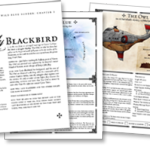Today, on #RPGaDAY, our writing prompt is Favorite Free RPG.
It’s still Lady Blackbird. I didn’t even need to think longer than a few seconds about that one.
Well, see you tomorrow.

Oh, wait. That’s not 500 words.
What I like about Lady Blackbird isn’t one specific thing. There’s a lot of great moments in those few pages of game material:
The opening. You’ve got a situation that throws the protagonists into peril, reading like a Republic Movies serial opening as it scrawls up the screen. It’s a wonderful technique and a throwback to the film serials that, due to being short movies that were designed to bring people back to the theater week after week, heavily imply near non-stop action and cliffhangers. ((It’s not a coincidence that George Lucas used the same technique in Star Wars back in 1976, followed by one of the most memorable openings to a movie. Go back and watch Star Wars and see how long it is until the first or fourth line of dialogue is uttered. What happens before that? Dire peril.))
The implied setting. We don’t know much about the setting: just enough to hook us in, not enough so the players at the tables get to flesh out the world. Anything as simple as what the imperial guards on board the Hand of Sorrow are in your game: Clockwork soldiers that need winding? Men in suits of armor with blasters? Women in caped Prussian uniforms weilding electro-sabres? To what the words “Imperial Expansion” implies on the map, or that slavery is outlawed on Haven — does the Empire have slaves, or are they fleeing from the Free Worlds? To the barely-mentioned-in-the-game Sky Squids, featured on a diagram of relative sized that shows how small your ship, The Owl, is, in comparison. Especially how it would easily fit in the tentacles.
The characters. Aimed at each other with secret ((Secret to the characters, not to the players.)) goals and desires. “Will they be able to find the secret lair of the pirate king?” the game asks. “If they do, will Uriah Flint accept Lady Blackbird as his bride? By the time they get there, will she want him to?”
The character sheets. Right there are all the rules you need to play the game. The top half, your character. The bottom, the rules summary: how to do things, how to improve your character. It’s crazy clever how much game there is in that little space on the character sheet.
The refreshement scenes. You get to refresh your dice pool by takign a breather with another character, which drives the roleplaying, but there’s this fantastic line slapped at the end that really made our game of Lady Blackbird an awesome game: Refreshment scenes can be flashbacks, too. That single line opened up the world and let us explore the space. We flashback to when Vance first met the Lady. We see the Lady’s life before her engagement. We can experience Count Carlowe’s and Uriah Flint’s power over the common folk. We can even jump back to a quiet moment at the beginning of the journey and watch Naomi and Kale steal a kiss.
When my group played, we ran five or six sessions. We made it to Flint’s base and by that time, no, she didn’t want anything to do with the scoundrel. The Owl, destroyed, the Lady, she took command and stole Count Carlowe’s ship, fleeing into the blue with her crew. A happy ending after all, but probably not the one your group would have.
Lady Blackbird: still a masterpiece.



